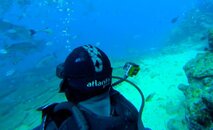If I need to go for a closeup shot I'll signal my Fiancé or she'll signal me and point at something she thinks I should shoot,at which point i'd head over and she'll hover in my peripheral. Situational awareness still remains key,those shots don't outweigh anything else
What makes me think i'm good enough to film and dive? Good trim and land-on-a-dime buoyancy and rescue training helps me. You basically have to feel comfortable in the water without your hands,as you'll sacrifice 1/both if you aren't using a static camera setup. You also need to know the camera inside and out,should be able to activate and adjust without fiddling forever
What makes me think i'm good enough to film and dive? Good trim and land-on-a-dime buoyancy and rescue training helps me. You basically have to feel comfortable in the water without your hands,as you'll sacrifice 1/both if you aren't using a static camera setup. You also need to know the camera inside and out,should be able to activate and adjust without fiddling forever




